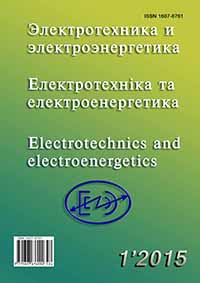METHODS AND MEANS OF TECHNICAL LOSSES REDUCTION OF ELECTRICITY IN THE ELEMENTS OF POWER SUPPLY SYSTEMS
DOI:
https://doi.org/10.15588/1607-6761-2015-1-13Keywords:
power supply systems, electric energy losses, operating conditions of the elements of power-supply systems, power-supply lines, electric energy savingsAbstract
The aim of the work is to determine the factors that influence the change of electricity technical losses and the dynamics of power losses change depending on the exploitation term of the elements of power supply systems. This will allow to develop more accurate methods for determining the electric energy losses and calculate the real value of the power losses in the elements of the power supply system that have been operated for a long time. The task of electricity losses reduction is an important part of the more general problem of reducing energy consumption and efficient use of energy resources through the optimization of consumption and power generation.In the context of continuous growth of power rates and change of energy consumption, the energy saving and rational management of the power economy get the great importance and present not only engineering problem, but also the economic problem. Hence the need to reduce non-productive energy losses and improve the technical operation of power supply system appears. Currently, much attention is paid to the electric energy losses reduction through the development of more accurate methods of the energy losses determination in all elements of power systems.
The analysis shows that the change of power losses is determined by changing of the permanent electric networks reconfiguration as a result of their reconstruction and changes in the conditions and frequency of use, as well as the technical state of the elements of power supply systems during the operation
References
Кудрин Б. И., О потерях электрической энергии та мощности в электрических сетях // Энергетика. – 2003. – №2. – С.3
Шкрабець Ф.П. Класифікація і структура втрат електроенергії / Ф.П. Шкрабець, Ю.В. Куваєв, Д.В. Ципленков, П.Ю. Красовський // Вісник Кременчуцького державного політехнічного університету. – Вип. 3(32). – 2005. – С.122–124.
ГНД 34.09.204-2004. Методичні вказівки з аналізу технологічних витрат електроенергії та вибору заходів щодо їх зниження / М-во палива та енергетики України. – Офіц. вид. – К.: ГРІФРЕ: М-во палива та енергетики України, 2004. – 159 с.
Потери электроэнергии в электрических сетях энергосистем /Под ред. В.Н. Казанцева. – М.: Энергоатомиздат, 1983. – 368 с.
Шкрабец Ф.П. Эксплуатационная динамика потерь электроэнергии в системах электроснабжения: монография / Ф.П. Шкрабец, П.Ю. Красовский; М-во образования и науки Украины, Нац. горн. ун-т. – Д. НГУ, 2015. – 152 с.
Pavlo Krasovskiy. Operating dynamics of parameters and technical losses in the components of power supply systems / P. Krasovskiy, D. Tsyplenkov, O. Nesterova // Energy Efficiency Improvement of Geotechnical Systems. – London: Taylor & Francis Group, UK, 2013. – P. 113–119.
Downloads
How to Cite
Issue
Section
License
Copyright (c) 2017 D. V. Tsyplenkov, P. Yu. Krasovskiy

This work is licensed under a Creative Commons Attribution 4.0 International License.
Creative Commons Licensing Notifications in the Copyright Notices
Authors who publish with this journal agree to the following terms:
Authors retain copyright and grant the journal right of first publication with the work simultaneously licensed under aCreative Commons Attribution License that allows others to share the work with an acknowledgement of the work's authorship and initial publication in this journal.
Authors are able to enter into separate, additional contractual arrangements for the non-exclusive distribution of the journal's published version of the work (e.g., post it to an institutional repository or publish it in a book), with an acknowledgement of its initial publication in this journal.
Authors are permitted and encouraged to post their work online (e.g., in institutional repositories or on their website) prior to and during the submission process, as it can lead to productive exchanges, as well as earlier and greater citation of published work.

